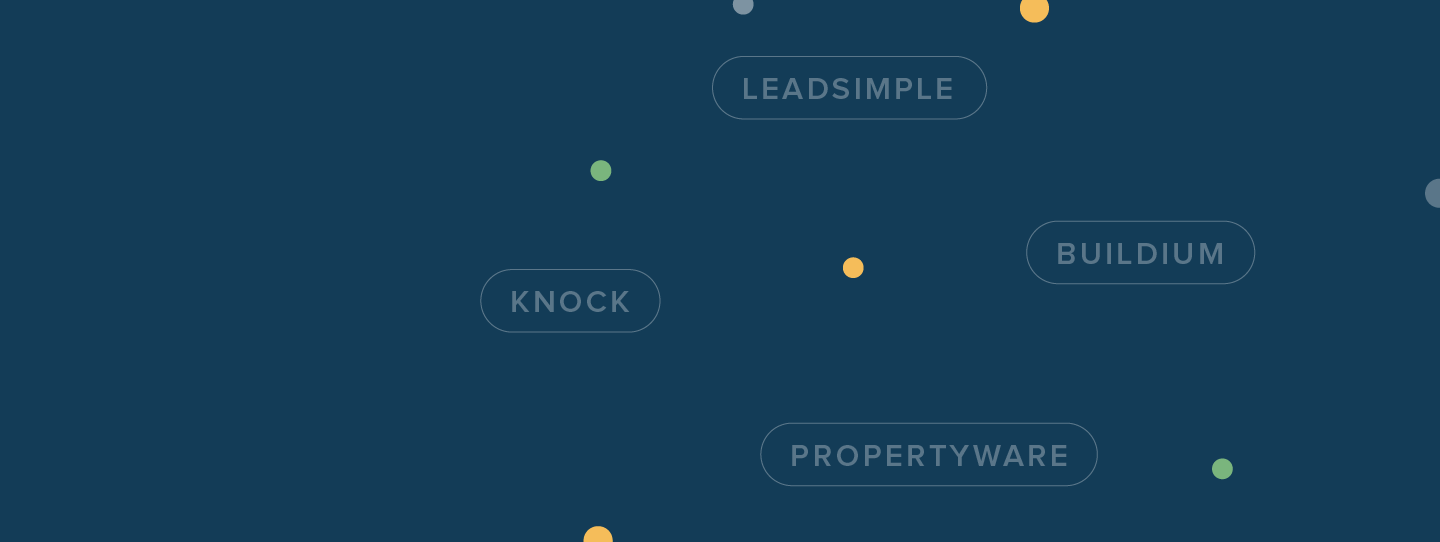The average day for a property manager is a web of interactions between owners, tenants, vendors, and new leads. The more a business grows, the harder it becomes to follow each thread and keep track of every important relationship.
Customer relationship management (CRM) software can help untangle that web, giving you a better understanding of your customers and more control over how you engage with them.
In this guide, we’ll look at four platforms that make CRM easier. We’ll explore what features go into an effective property management CRM tool and compare some of the best options—both stand-alone CRM software and platforms with powerful CRM features included—all of which are designed specifically for property managers.
What Is Property Management CRM?
At its core, property management CRM software—often referred to simply as CRM—is a business tool to help you manage and analyze interactions with both customers and leads. The ultimate goal of CRM is to improve customer retention and sales growth. It does that by compiling customer data from various communication channels, including emails, phone calls, live chat, social media, and website visits. With this comprehensive view, you can better understand each customer, critique and refine your sales strategy, onboard employees to new accounts, and reduce the time and effort it takes to nurture customer relationships.
For property managers, these relationships can extend beyond property owners, or “customers” in the conventional sense, to include vendors and tenants, as well. All of these stakeholders are important to property management, and how you interact with one of them can often set the tone for your relationship with the others.
Why Use CRM Software That’s Purpose-Built for Property Management?
If you’ve already done a bit of research into CRM, you’ve probably come across general CRM platforms such as Zoho® and Salesforce® that advertise specific features or entire products for real estate. You might have even found software such as PropertyBase® that’s designed specifically for real estate businesses.
Both of these types of software could serve you well if you’re a real estate agent or broker, or if you deal with the buying and selling of real estate in any other capacity. Property management, however, is a very different type of business, one that has its own sales funnels, customer interactions, and daily operations.
CRM software that’s purpose-built for property managers can address the challenges of doing business in this industry directly, making it a better choice if you want to get the most direct and immediate value out of the software you’re investing in.
Let’s explore what those benefits look like in action:
Benefits of Using CRM for Property Management
Using property management CRM software has benefits that extend beyond finding and building relationships with property owners. Here are the main ways effective CRM software can have a positive impact on your business:
#1: Find New Clients and Keep Them for Longer
A CRM can also help you secure and win new business through lead management tools. With effective CRM software, you can categorize and prioritize leads based on various criteria, making it easier to respond with timely and personalized follow-ups.
The insights into lead sources and effectiveness of marketing efforts that a CRM offers can be powerful tools to refine outreach strategies and lead targeting. If the software you choose prioritizes ease-of-use, any member of your team can have access to the entire lead lifecycle, pulling what they need to personalize their outreach and drive more conversions.
These very same tools can be used to nurture existing customer relationships, keeping you aware of complaints, reminding you when it’s time for a check in with a specific owner, and providing the context needed to personalize your outreach.
#2: Streamline Operations
Property management CRM software centralizes communication into one place, which makes it easier for many members of your team to get up to speed on a specific account or lead, whether they’re new or filling in for another employee. Having all those details in one place lets you draw insights and spot patterns in your sales strategies, as well, with less time spent collecting and organizing all the relevant data.
Many solutions allow you to automate tasks such as recording conversation details and setting reminders for follow-up calls and other interactions. This keeps you organized and saves you even more admin time. You can respond more quickly and accurately to inquiries and issues.
#3: Improve Tenant Relationships
Having all the relevant knowledge at hand also supports better tenant relationships. If your CRM tools extend to tenant management, you’ll be able to track tenant preferences and history, allowing for more tailored services and quicker resolution of issues. You can spot any recurring issues tenants may have and use past conversations with them to better understand everything from a dispute between residents to a missed payment.
This personalized approach is a fast track to increased tenant satisfaction and loyalty, resulting in longer leases, fewer vacancies, and fewer disputes. You can stay attentive to tenant needs and keep a reliable source of income flowing in for owners, all of which contributes to the type of reputation that wins new business.
#4: Create a Stronger Vendor Network
Finally, property management CRM helps with vendor relationships by keeping all the relevant details of specific vendors and work orders in one place. Many solutions save you time completing repair requests by putting all the parts of a work order in one place, from the initial request to every update shared between the vendor and your team.
You can see which vendor responds and completes tasks quickly and with a high level of quality, so you can rely on them for future work. This also makes it easier to manage contracts and share updates with other stakeholders, such as a tenant, owner, or team member.
Key Features of Property Management CRM Software
Clearly, CRM can affect several areas of your business, which means the list of tools that a particular software solution includes can be extensive. When comparing your options, keep in mind that CRM for property management should include these useful features:
Lead Outreach & Management
The first step in managing and converting leads is tracking. CRM software should capture and organize leads from various sources. From there, you should be able to segment and prioritize leads based on criteria such as urgency, property type, or budget.
Another helpful tool is the ability to send out automated responses and reminders for timely follow-up with leads. All of your communication should be integrated across channels (email, messaging, calling, chat) and recorded using an activity logging tool.
You should be able to view all these records and draw insights such as lead conversion rates, lead sentiment, and the overall effectiveness of marketing campaigns from them.
These features collectively help in managing potential clients and enhancing the chances of winning new business.
Owner Communication & Relationship Management
Managing relationships with your existing owners can be even more complex. You’ll need to keep up with various types of property and financial details and communicate effectively, not to mention make time for general relationship-building outreach.
Personalized dashboards for owners can help by giving owners access to property information and financial reports without having to request anything from you directly. It will give your team a view of communication history with owners, as well. You should be able to set automated notifications for important events or updates related to their properties. The best software even lets you auto-generate certain reports or draw from pre-built templates to get information out quickly.
When you have to reach out directly, integrated messaging or email systems avoid the extra work of jumping between applications, while making it easier to keep those various forms of communication in one place.
As standard practice, any reports, records, and documents you share with owners should be secure, along with all other types of communication that you use a CRM platform for.
Lease History & Tenant Communication
Property management CRM software should make it easier to manage tenants and keep them happy. This takes visibility into their entire lease history, starting with records of current and past lease agreements. These documents should be easily accessible for both you and tenants, so there’s full transparency regarding the obligations and expectations for each party.
A communication portal or log can also help you keep a clear, detailed record of all conversations with tenants, including any requests they make.
Alongside these elements, you should have details on preferred contact and emergency information, records of past payments, and rental history. Tenant profiles are one way to keep this information together and easy to reference at any time.
As with new client leads and owners, look for automation capabilities in whatever tenant communication tools your CRM software offers.
These features help you stay ahead of tenant concerns and equip you with all the right information to handle issues such as neighbor disputes or missed rent payments.
Work Order Visibility & Vendor Management
While not the primary function of CRM software, vendor relationships are an important pillar of property management that can affect your other relationships with both owners and tenants.
A vendor database that includes all the contact details of the vendors you work with, services they offer, past jobs, and notes on the quality of their work can help you assign out work orders quickly. Some software even has the capability to assign work orders automatically to appropriate vendors, which saves your team even more time.
You should also have a system that tracks work orders from creation to completion, with tools to send and receive real-time updates on the progress of a job. This system, often included in property management software, should let you manage invoices from vendors and track payments.
Scalability & Integrations
When shopping for any kind of software, you’ll want to find a solution that’s flexible enough to grow with your business and integrate with other existing and future software you’ll use.
Purpose-built property management CRM software has a leg up on more generic alternatives, here. It often has the ability to integrate easily with other types of property management-focused tech. The best software has tools for other property management operations, such as accounting and showings, already built in.
Your lead-tracking tools should integrate with marketing platforms for campaigns and lead generation. Tenant and owner management tools should connect with your accounting system, as well, so you can avoid duplicate work and minimize the human error that comes with jumping between software.
To help you scale quickly look for time-saving features such as pre-built, industry-specific templates, and the ability to customize workflows to accommodate higher door counts. Likewise, an open API that lets you create custom tools and fields can likewise extend the benefits of your CRM software as your business evolves.
1. Buildium: One of the Best Comprehensive Property Management Software Solutions
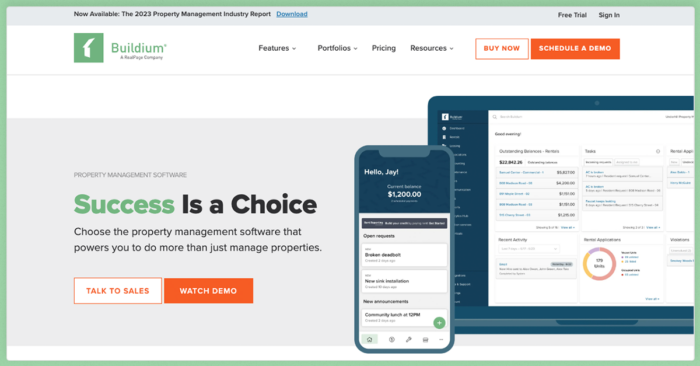
Buildium® is an industry-leading platform with features that are purpose-built for property managers. Its tools are scalable and effective for every size portfolio and several property types, including single-family, multifamily, community associations, student housing and commercial buildings.
While Buildium is not specifically CRM software, it integrates with the industry’s top CRM solutions. Its communication tools are deeply integrated with other features such as property accounting and lease management, making it ideal for managing relationships with both owners and tenants.
Many of those tools, including rental listing syndication, an integration with Tenant Turner’s® Showings Coordinator, and easily customizable and shareable online rental applications, can help you find tenants and guide them through the leasing process
Through Buildium Marketplace, you’ll also have access to an ecosystem of partner solutions, including LeadSimple®, a proven platform for managing leads.
Because Buildium is comprehensive, you can view and share all the relevant information that underpins a successful stakeholder relationship, from lease agreements and payment history to past work orders and the financial health of every unit and property.
Features
Buildium, includes an impressive suite of property management features that helps you manage each type of relationship in your business.
The Owner Portal is a central place for your team to share financial information with your clients, generate and post reports using custom fields and pre-built templates, access financial history for properties, send out automated notifications, and track communication across channels.
The Resident Center is a go-to hub, complete with its own app, for tenants to complete payments and other charges, request repairs, access important updates, and reach out to you directly. Your team can use the Resident Center to keep tenants in the loop, track past conversations, share documents, and even foster a community through property message boards.
To enhance vendor relationships, you can make use of Buildium’s maintenance management features that stores vendor information, project history, and past communication. You can also use these features to give, receive, and track work order updates and manage contracts, and make payments.
These are all supported by Analytics & Insights included in the Growth subscription that keep you and your customers up to date on the health of every property, along with accounting, rent collection, marketing, and tenant screening tools, just to name a few.
The platform’s open API lets you connect important data with other software you’re already using, as well.
Pricing
Buildium offers three pricing tiers, all of which include:
- Accounting
- Maintenance Task Management
- Violations
- Online Portals
- Resident & Board Member Communications
Each of the three tiers is designed to help you maintain reliable, transparent communication with all your stakeholders and nurture customer relationships. They support your overall business and property management efforts, as well.
Essential: Starting at $58/month, Essential includes Buildium’s core features and is intended for property management companies who are looking for basic accounting and task management tools.
Growth: Starts at $183/month and includes reduced incoming ACH fees, unlimited eSignatures, and actionable insights in Analytics Hub.
Premium: Starts at $375/month for property managers who want to automate their workflows. It includes everything in Growth, unlimited incoming ACH (fees waived), plus access to Buildium’s Open API and Priority Support.
2. Propertyware: Property Management Software with Customizable CRM
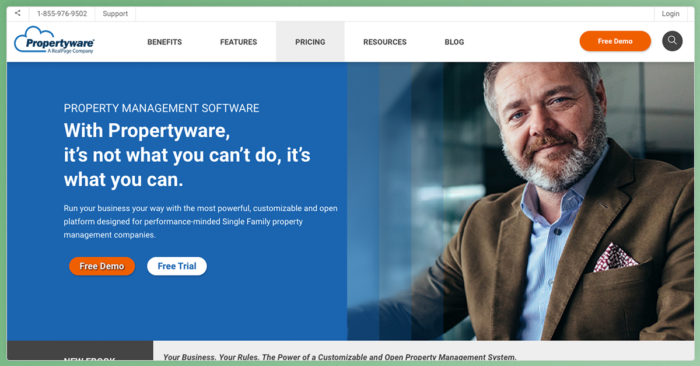
Propertyware® is a fully customizable property management platform that caters to property managers with a variety of portfolio sizes and property types.
Propertyware’s focus on customization allows you to set up and fine-tune effective workflows for every part of your business.
Features
Propertyware’s features allow for detailed and personalized CRM. This includes:
Lead tracking with the ability to monitor unlimited lead sources, use multiple flyer formats, customize prospect types, and enable one-click conversion from lead to lease.
Tenant and owner portals that allow for two-way communication on any device for both owners and residents along with real-time visibility into property performance for owners and rent payments and vendor requests for tenants. Conversations are stored within individual portfolios for easy reference
Vendor management tools that let you create unlimited lists of standardized tasks and pricing for different jobs, dispatch vendors, track progress, and handle invoices, all on-platform. You can even set up recurring work orders and assign your preferred vendors for faster repairs.
All of these features include the ability to create or customize fields, dashboards and reports. While this takes some initial effort and experience to set up, it can be a powerful asset for growth-focused property management companies with unique needs.
Like Buildium, Propertyware features an open API, which allows you to connect the other apps you rely on or build your own to meet a specific need.
These features are available alongside several other tools for accounting, maintenance, lead-to-lease, multi-location management, utility and bill management, and owner and resident insurance.
Pricing
Propertyware organizes their pricing into three tiers: Basic, Plus, and Premium.
Basic starts at $1 per unit per month, with a $250 minimum. Plus starts at $1.50, with a $350 minimum and Premium starts at $2 with a $450 minimum.
The one-time implementation cost for all three tiers is twice the monthly subscription price.
3. LeadSimple: Sales-Focused Property Management CRM Software
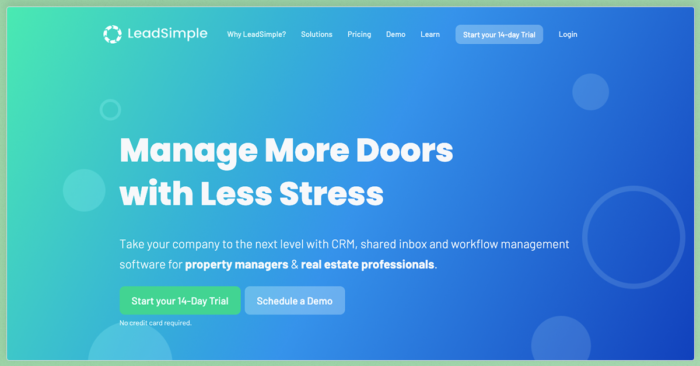
LeadSimple is a lead-management CRM platform that integrates directly with Buildium. It combines an industry-leading sales CRM with communication and process management tools to help you convert prospects faster and with less effort.
Features
LeadSimple’s platform is built around a CRM system that’s designed specifically for property managers. With it, you can:
- Get notified about each new lead in real-time and reach out to them with a single click
- Automate task reminders, responses, and drip campaigns
- Import leads from different marketing channels and route them to specific agents
- Utilize pre-made templates to help close deals faster
- Track all your communication, including individual conversations, activity for specific agents
- Measure your success and set targets with response time, agent performance, marketing performance, and other metrics available in real time
LeadSimple includes a shared inbox that stores all your emails in one place. This makes it easier to find an email, avoid duplicate outreach, and track communication over time.
Another key feature is the workflow process tool that lets you build and customize your own sales workflows that you can adapt as you scale. You can use these workflows to trigger processes automatically based on delinquencies, move-ins, lease renewals, move-outs, and other criteria that you set.
Pricing
LeadSimple’s two pricing options are Growth/CRM and Operations.
Growth/CRM is intended for streamlining sales processes. It begins at $99 per month and includes all of the major sales workflow features that the company offers. Pricing covers:
- Two users ($30 per additional)
- One lead pipeline ($30 per additional)
- Every additional phone number is $4 per month
- 5 cents per minute for phone calls after the first 250 minutes
- 2.5 cents per text sent
The Operations plan includes everything in the growth plan plus customizable process dashboards, all of the company’s operational workflow features, and integrations with other property management software, including Buildium. It starts at $1.35 per door per month with a minimum base price of $200 (150 doors included).This tier also includes:
- Unlimited users
- Unlimited sales pipelines
- Unlimited process types
- $4 per month per texting phone number
- 5 cents per call minute after the first 500 minutes
- 2.5 cents per text
4. Knock: Multifamily Property Management CRM Software
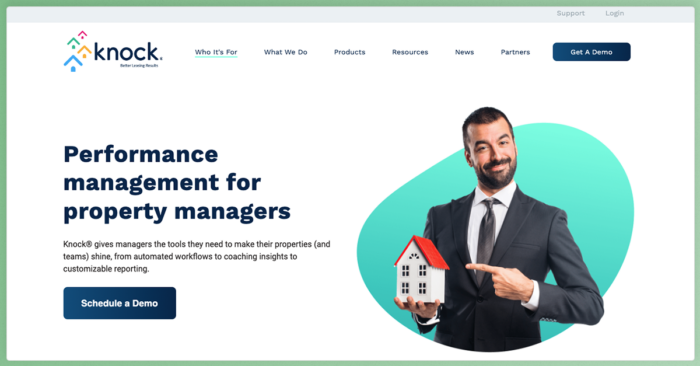
Knock® is a user-friendly CRM platform supported by RealPage® that’s built specifically to meet the needs of multifamily property managers. The software is all about making your operations more efficient with lead monitoring tools, benchmarking, and performance trends. You can use these tools to support your efforts to both find new clients and engage renters.
Features
Knock’s array of features includes:
- Task management and tracking tools for your team
- Automated reporting and team oversight with performance benchmarking
- A central dashboard for monitoring leads and leases
- Attribution data, automated campaigns, and tools to support different marketing channels
- Communication with leads through, email, text, voice, and chat using a single screen
- A team calendar to keep you organized
On top of these features, Knock offers several scheduling tools to speed up the lead-to-lease process and attract more qualified applicants to your properties.
Pricing
Knock doesn’t include pricing information on their website, so you’ll have to reach out to their team directly for more detaills.
What Is the Best CRM for Property Management?
So what’s the best software on the list? The answer largely depends on your particular needs as a company.
As a general rule, purpose-built property management CRM software offers capabilities with a greater variety of benefits that more directly support your sales and customer relationship efforts. Comprehensive property management software such as Buildium or Propertyware, takes those benefits one step further by connecting all of your operations in one platform. This puts all the important details you need on tenants, owners, and leads in one place. The result is a team that’s equipped to not only provide high quality service, but also actively grow your business every day.
We recommend testing one or more of these platforms out to see what works for you. Luckily, Buildium offers a free 14-day trial with no credit card required. You can put it to test risk free and see just how much it can benefit both you and your customers.

